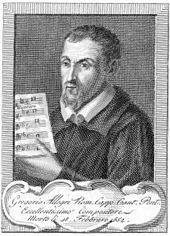Gregorio Allegri
Gregorio Allegri (* 1582 in Rome ; † February 7th July / February 17, 1652 greg. Ibid) was an Italian priest, composer and tenor singer .
Life
From 1591 Gregorio Allegri was a choirboy at San Luigi dei Francesi and, like his brother Domenico Allegri (1585–1629), a pupil of Giovanni Maria Nanino and his brother Giovanni Bernardino Nanino . After his ordination, he was Kapellmeister at Fermo Cathedral from 1607 to 1621 , then from 1629 until his death a singer in the Papal Choir of the Sistine Chapel in the service of Pope Urban VIII.
His most famous composition is the two-choir Miserere , which has undergone many additional influences and changes over the years. The piece was performed every year on Holy Week in the Sistine Chapel until 1870 and was allegedly prohibited from being copied. During a visit there in 1770, Wolfgang Amadeus Mozart is said to have heard the piece of music and later wrote it down from memory. A first publication of the work from 1771 comes from Charles Burney . It could be thanks to him and Mozart that the piece was not lost forever. The miserere also impressed Johann Wolfgang von Goethe .
Elam Rotem and Jörg-Andreas Bötticher describe the story about Mozart as at least strange. Whether its use outside the Sistine Chapel was actually prohibited is an uncertain tradition. The author William Smith Rockstro of the article in the Grove Dictionary of Music and Musicians from 1880 also made other errors in the notation. Rockstro did not understand that Felix Mendelssohn Bartholdy made the notation a third higher by ear and also not which part he wrote down in notes. This led to the actually wrong notation of the c '' ', which has developed a certain tradition since 1880.
Other works
- Concertini , 2–5 voices with basso continuo, libro I , Rome 1618, lost
- Concertini , 2–5 voices with basso continuo, libro II , Rome 1619
- Motecta Collection , 2-6 voices, Rome 1621
- Sinfonia a 4 , in Musurgia universalis by Athanasius Kircher , Rome 1650
- Il salmo Miserere mei Deus , 9 voices
- Missa Che fa oggi il mio sole , 5 voices
- Missa Christ resurgens , 8 voices
- Missa In lectulo meo , 8 parts
- Missa Salvatorem exspectamus , 6 parts
- Missa Vidi turbam magnam , 6 voices
- 2 Lamentationes Jeremiae prophetae , around 1640; 1651
- Te Deum , 8 voices
- Laudation lively , 8 voices
- more than 20 other individual motets
literature
- Karl Gustav Fellerer, SL: Allegri, Gregorio. In: Ludwig Finscher (Hrsg.): The music in past and present . Second edition, personal section, volume 1 (Aagard - Baez). Bärenreiter / Metzler, Kassel et al. 1999, ISBN 3-7618-1111-X ( online edition , subscription required for full access)
- Kerstin Helfricht: Gregorio Allegri. Biography, catalog raisonné, edition and studies on the low-voiced, concerted motets with basso continuo . Schneider, Tutzing 2004. ISBN 978-3-7952-1171-4
Web links
- Literature by and about Gregorio Allegri in the catalog of the German National Library
- Sheet music and audio files by Gregorio Allegri in the International Music Score Library Project
- Sheet music in the public domain by Gregorio Allegri in the Choral Public Domain Library - ChoralWiki (English)
- Sound example: Miserere mei deus from Psalm 51
- Jerome Roche, Noel O'Regan: Allegri, Gregorio. In: Grove Music Online (English; subscription required).
Individual evidence
| personal data | |
|---|---|
| SURNAME | Allegri, Gregorio |
| BRIEF DESCRIPTION | Italian composer and singer |
| DATE OF BIRTH | 1582 |
| PLACE OF BIRTH | Rome |
| DATE OF DEATH | February 17, 1652 |
| Place of death | Rome |
